The adventure that didn't quite go to plan
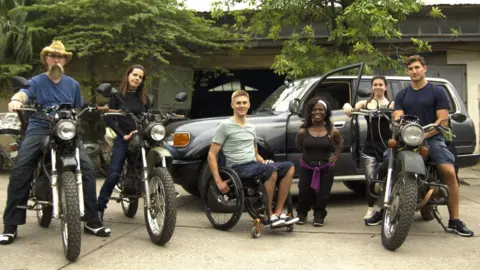 BBC
BBCMary Russell, a black woman with dwarfism, set off on a 21-day, 900-mile trip down the Ho Chi Minh trail with five other disabled people. She imagined it would be a unifying experience, but in fact she felt isolated among people she thought would be more like her.
"What made it for me was the beautiful scenic views," she says. "How can you be miserable when you're looking at mountains?"
But in fact, for some of the time at least, Russell would feel more isolated and different than she had done before as she filmed for the BBC One programme, Without Limits: Vietnam.
Russell is used to her difference. She grew up as one of nine children, but the only one with achondroplasia - a common cause of dwarfism - and her skin-colour could also cause issue in 1970s Yorkshire when "awareness just wasn't there".
For the journey through Vietnam, Russell, 48, travelled in a vehicle with Vicky Balch, who lost her leg in the Alton Towers rollercoaster accident and Steve Brown, a Paralympic wheelchair rugby player who's paralysed from the chest down.
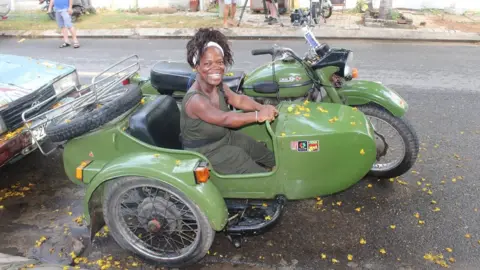 Mary Russell
Mary RussellLouise Halvey, who has progressive hearing loss, travelled on a motorbike alongside Charlie Lewis, who opted for a right leg amputation after a snowboard accident, and Andy Slade who lost an arm in an industrial accident.
But there was a new kind of difference here - Russell was the only one of the six to have always had a disability rather than having acquired it later in life.
"The group had all gone through something quite traumatic and I had to try to figure out where I fit in with that," she says.
The rest of the group were able to talk together about how they became disabled by accident or illness and how it made them feel but Mary felt left out because she had never had that experience.
"It was hard because they weren't born this way, they lived most of their life mingling with society, and at times I felt like I needed a limb missing so I could feel part of the group."
The team travelled from the north to the south of the country and spent up to seven hours a day in the car, which she describes as "really rough".
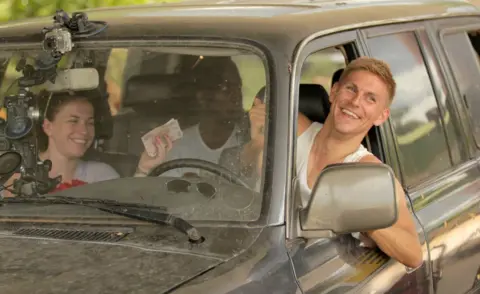
As the others bonded over coming to terms with a new impairment, Russell became affected by what she acknowledges as her main disability - depression.
"My mood dipped almost immediately," she says.
The atmosphere in the car soured at times and arguments broke out. The group were often short on sleep and the travelling could be uncomfortable.
"I've struggled with depression, which nobody really understands because they automatically think it's the dwarfism that holds me back, but at times, mental health is my biggest challenge."
Russell says she identified the slump in her mood early on in the journey when she "felt like I was going out of control".
She became fractious and tearful and with no one to confide in she told the whole group how she felt.
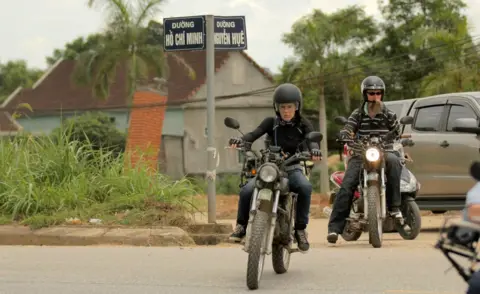
"I didn't want people to think this was how I usually am," she says. "They said they were completely unaware I felt isolated but were grateful I had spoken and they became more inclusive."
At home in London, Russell uses cycling as a "remedy" for her depression and when the group visited a village they spotted a boy with a bike. He was persuaded to lend it to her and she free-wheeled down the hill which gave her some relief.
Russell says the group provoked intrigue wherever they went, but she felt she received a "double stare".
"I stood out for sure," she says. "I have the condition and I'm of colour."
Mary's short stature often prompted laughter from Vietnamese locals which she found overwhelming at times.
"For some reason dwarfism as a disability always seems to be the butt of jokes and when they saw me they wanted to laugh, which is the battle we always have.
"They wouldn't touch me ... but people were fascinated by the others and wanted to touch their prosthetic legs."
But there was an unexpected moment of joy one day which made Russell confront her own judgements.
"I met a guy, a dwarf, when we went shopping. He was stood outside his shop and at first I walked on by.
"For a moment I slipped into 'old Mary' where I wasn't comfortable with seeing someone like myself, but I made myself go back and say 'hello' to him.
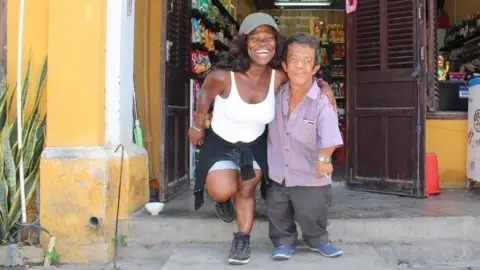 Mary Russell
Mary Russell"I immediately connected with him, we shook hands and hugged. It was the highlight of my trip."
The group all completed the journey, weary but fulfilled. Russell remains close to Halvey and Slade who made her see her own prejudices.
"They helped me and gave me support," she says. "They're both bikers so I didn't think I'd get on with them, but we hit it off and it made me realise you really can't judge anyone."
Russell has taken part in reality TV before - in 2014 she appeared on the disability dating show, The Undateables.
The positive response she got from that boosted her confidence and she was signed to model agency, Models of Diversity, which has led to numerous photo-shoots and a fashion runway in Japan.
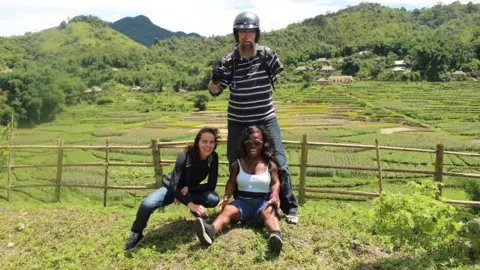 Mary Russell
Mary Russell"From The Undateables onwards I started to find out things about myself - positive and negative," she says. "Even if it upsets me I'm emptying out all the hurt and developing as a person."
Though the Vietnam trip brought unwanted attention to her differences, Russell says it has made her accept herself in a new way.
"It made me realise that my limbs might be shorter, but they're functional and I can use them and should be grateful.
"I want to go to more places where there are less people like me. Everyone needs to see that this is what's in the world."
Mary Russell's roadtrip story is told on Without Limits: Vietnam. The second episode will be broadcast Thursday 21 September at 20:00 on BBC One, and will be available to watch via BBC iPlayer for 30 days afterwards.

